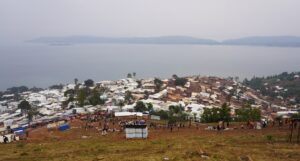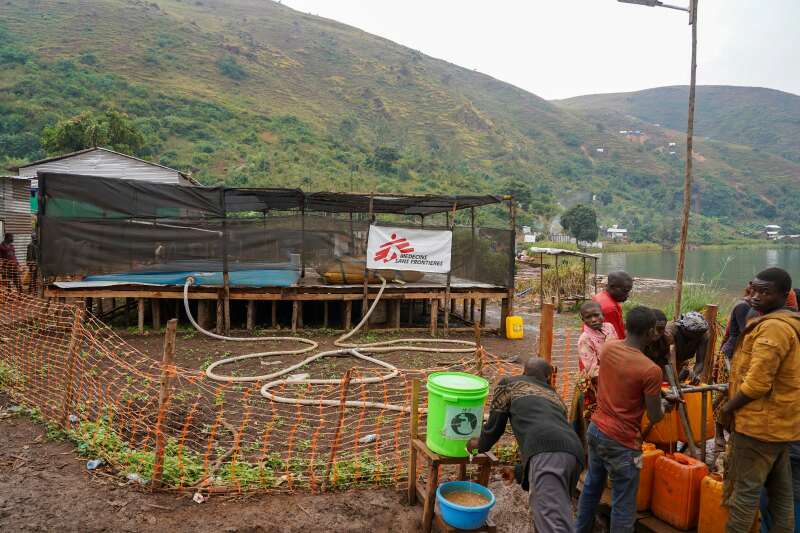More than 600 patients—many in critical condition—have been treated in a Cholera Treatment Unit (CTU), a temporary 20-bed facility set up by Médecins Sans Frontières (MSF).
In early May, Médecins Sans Frontières (MSF) launched an emergency response to a cholera outbreak in Lomera, in the Democratic Republic of Congo (DRC). The discovery of gold in the village triggered a massive influx of people. Combined with a severe lack of hygiene infrastructure, this has greatly accelerated the spread of the disease. Over 8,000 people have been vaccinated and more than 600 patients have received treatment. MSF teams have been working tirelessly to care for the sick and improve access to clean water.
Until recently, Lomera was a small village on the shores of Lake Kivu in the DRC. Everything changed overnight last December when gold was discovered in the surrounding hills. Economic insecurity, exacerbated by clashes between the M23/AFC armed group, the Congolese army (FARDC), and their Wazalendo militia allies, turned Lomera into a gathering point for thousands of people in search of work and financial gain.

Cholera is endemic in this part of the DRC, with Lake Kivu contaminated by the bacteria. However, an outbreak of this magnitude is unusual. The first 13 cases in Lomera were reported on April 20. Within two weeks, the number had increased by over 700%, reaching 109 cases—a likely underestimation. Today, Lomera accounts for 95% of all cholera cases in the Katana health zone, which has a population of over 275,000.
In just a few months, Lomera’s population has swelled from 1,500 to over 12,000 people. Every day, new arrivals crowd into already-overfilled shelters—sometimes with up to 20 people living in a single space. “We are living in very difficult conditions. We do what we can to survive,” says Chiza Blonza, 45, who left her farm in Walungu (about 90 kilometers from Lomera) to work in the mines.
“All the conditions for a cholera outbreak are present here,” says Matilde Cilley, MSF project medical referent. “We’re seeing extreme overcrowding, a severe lack of drinking water, open defecation on the hills, and a complete absence of waste management.”
MSF has been the main international organization to respond, launching an emergency intervention on May 9. In just four days, over 8,000 people were vaccinated—though due to insufficient doses, only one shot could be administered instead of the recommended two. At the same time, over 600 patients—many in critical condition—were treated in a temporary 20-bed Cholera Treatment Unit (CTU) set up by MSF.
“The vast majority of our patients work in the mines, where they use the lake’s contaminated water to extract gold from the soil, exposing themselves directly to the bacteria,” explains Dr. Théophile Amani, an MSF doctor in Lomera. “Intense physical labor combined with heavy alcohol consumption means many arrive already dehydrated—even before they’re infected.”
MSF teams have also set up a water treatment and distribution station by the lake, providing about 60,000 liters of clean water per day. One hundred latrines and 25 handwashing points, overseen by health promoters, have been installed in the camp. “Without significant investment in water, sanitation, and hygiene infrastructure, outbreaks like this will keep happening,” warns Muriel Boursier, MSF Head of Mission in Bukavu. “Right now, the nearest well is three kilometers away. International partners and local authorities must act to implement sustainable solutions.”
Given the constant flow of people coming and going, new vaccine shipments are also essential to protect the population. “South Kivu—and eastern DRC more broadly—faces huge logistical challenges in delivering essential medical supplies, including vaccines, medicines, and equipment, to the places that need them most,” says Muriel Boursier. “While insecurity certainly plays a role, the closure of the airports in Bukavu and Goma has had an even greater impact, severely hindering the delivery of life-saving aid. On top of that, cuts in international humanitarian funding are limiting the availability and distribution of medical supplies throughout the country.”







OTHER ARTICLES
Cameroon: A beacon of hope for adolescents and young people living with Human Immunodeficiency Virus (HIV)
Antibiotic Resistance on the Rise Worldwide, Warns WHO
States Set Targets to Prevent and Treat Noncommunicable Diseases and Mental Disorders